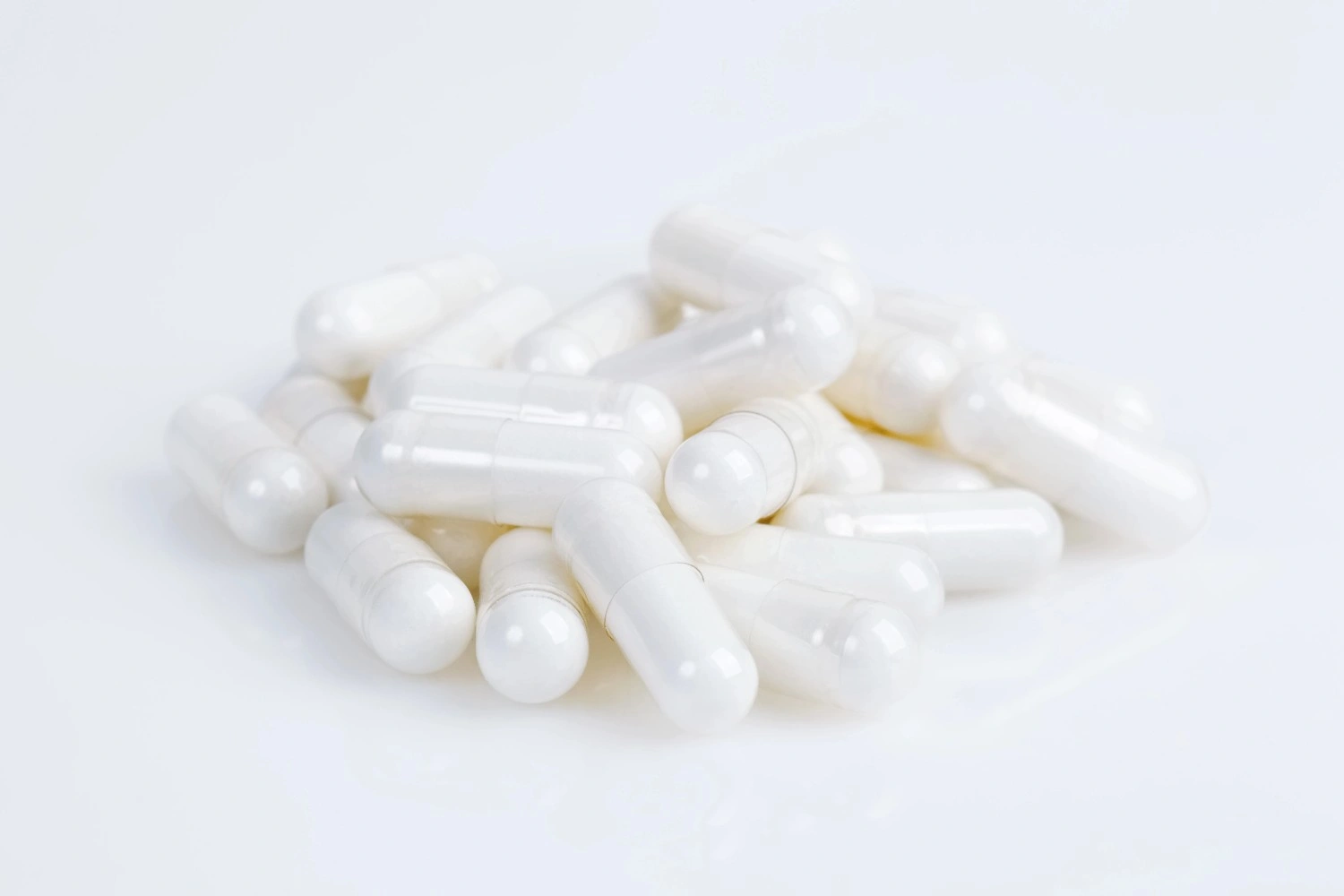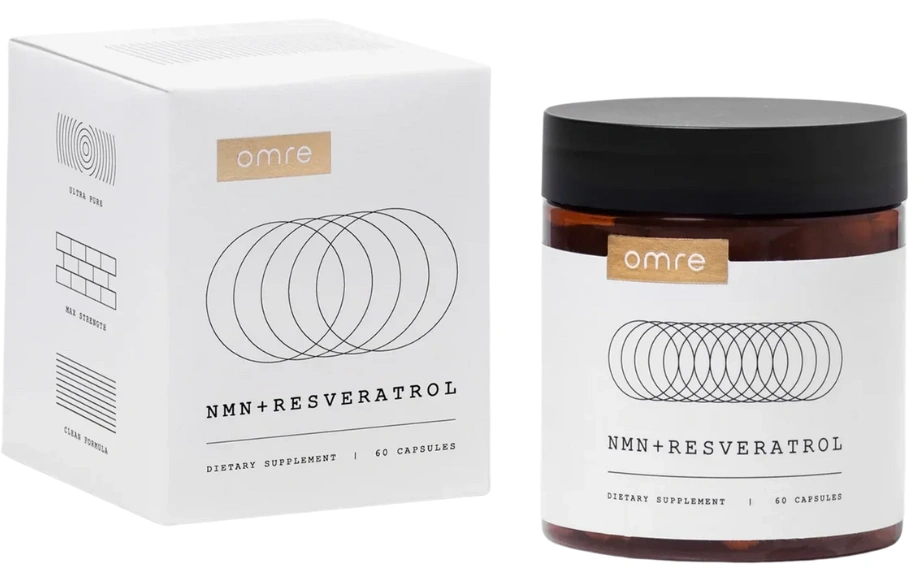Table of Contents
NAD boosters are supplements or compounds that help increase your body’s levels of NAD, a molecule that plays a key role in energy, aging, and overall health. Many people take NAD boosters hoping to feel more energetic, slow down aging, or improve brain and heart function.
In this article, we’ll explain what NAD is, how NAD boosters work, the types available, what science says about them, and whether they’re safe or effective for long-term use.
NMN + RESVERATROL
Cellular NAD+ booster with ultra-pure NMN and Resveratrol, at research-backed doses.*
What Is NAD?
NAD (nicotinamide adenine dinucleotide) is a natural substance found in every cell in your body. It helps turn the food you eat into energy and supports important functions like DNA repair and healthy aging.
As we get older, our NAD levels go down. This drop is linked to things like lower energy, slower metabolism, and signs of aging. That’s why scientists and health experts are interested in finding ways to raise NAD levels, hoping it might help people stay healthier for longer.
NAD works behind the scenes to support your mitochondria (the part of your cells that produces energy). It also helps activate enzymes called sirtuins, which are involved in repairing damaged DNA and protecting cells from stress.
You don’t need to memorize the science, but just know this: NAD is a key player in keeping your cells running smoothly. And when it runs low, problems start to show up.
What Are NAD Boosters?

NAD boosters are supplements or natural compounds that help your body make more NAD. They usually contain ingredients like NMN, NR, or Resveratrol that support your body’s natural NAD production.
Think of NAD boosters as “helpers” that give your body the raw materials or signals it needs to create more NAD. Some work by giving you the direct building blocks, while others activate pathways that encourage your body to produce more of it.
These boosters have become popular because early research suggests they might help improve energy levels, slow signs of aging, and even protect against some health issues. However, most of these benefits are still being studied in humans.
You can get NAD boosters through supplements, certain foods, or even IV therapy. In the next section, we’ll look at the main types of NAD boosters and how they compare.
Types of NAD Boosters
There are a few different ways to boost NAD in your body. Some are found in supplements, while others occur naturally in food. Here are the most common and researched types:
Nicotinamide Mononucleotide (NMN)
NMN is a direct precursor to NAD, meaning your body turns it into NAD very quickly and efficiently. That’s why many scientists believe NMN is one of the most effective NAD boosters available.
In animal studies, NMN has shown promising results for improving energy metabolism, increasing physical activity, and supporting heart and brain health (1).
One study in mice found that NMN supplementation helped reverse age-related declines in blood flow and endurance (2).
In humans, early research is encouraging. A clinical trial showed that NMN improved insulin sensitivity in overweight adults (3).
However, more large-scale studies are needed to confirm long-term safety and benefits.
Nicotinamide Riboside (NR)
NR is another popular NAD precursor found in some foods and used in many commercial supplements. Once inside the body, NR is converted into NMN, and then into NAD.
Studies have shown that NR is well-absorbed and effective at raising NAD levels (4). In one human trial, people taking NR for six weeks saw a significant increase in their NAD levels without serious side effects (5).
While NR has fewer human studies than we’d like, it’s still one of the most widely used and best-known NAD boosters on the market.
Resveratrol
Resveratrol doesn’t directly turn into NAD, but it boosts NAD levels by activating sirtuins—enzymes that depend on NAD to work. In simple terms, resveratrol “tells” your cells to make more NAD by mimicking the effects of calorie restriction.
Resveratrol is found in red grapes, berries, and red wine. It’s been studied for its anti-aging and anti-inflammatory effects.
A 2006 study in Nature found that resveratrol increased the lifespan of mice on a high-fat diet, possibly by improving mitochondrial function (6).
That said, resveratrol has poor absorption on its own. Taking it with fat (like with a meal) can improve how well your body uses it.
Niacin (Vitamin B3)
Niacin is one of the oldest known NAD precursors, and your body can use it to make NAD. It’s found in foods like turkey, tuna, and peanuts.
At high doses, niacin can raise NAD levels, but it also comes with side effects like flushing and upset stomach. Because of this, it’s not as commonly used for NAD boosting compared to NMN or NR.
Still, niacin is effective and may be more affordable than newer supplements. Some people prefer it for that reason.
Do NAD Boosters Really Work?
NAD boosters have been shown to increase NAD levels in the body, but more research is needed to confirm whether they actually lead to long-term health benefits in humans. Early studies are promising, especially in animals and small human trials, but larger clinical studies are still ongoing.
As we age, NAD levels naturally decline, which can affect how our cells produce energy and repair themselves.
Precursors like NMN and NR are being studied as ways to restore NAD and potentially slow down some signs of aging. In mice, these supplements have been shown to improve lifespan, physical activity, and even heart and brain health.
In humans, early results are encouraging. A 2021 study found that NMN improved insulin sensitivity in overweight postmenopausal women (7).
Another 2023 study showed that high doses of NR (1500 mg twice daily) improved NAD levels and helped reduce symptoms in people with Parkinson’s disease (8).
Researchers are also looking into how NAD boosters affect muscle strength, cardiovascular function, and brain health.
A small trial showed NAD supplementation may support better mitochondrial function in people with heart failure (9).
However, most of these benefits are still being explored, and experts stress the need for larger, long-term studies.
So far, NAD boosters do appear to work in raising NAD levels and supporting some cellular functions, but whether they can truly slow aging or prevent disease in humans remains to be seen.
Benefits of NAD Boosters
 NAD boosters may offer a range of potential health benefits, especially in areas related to aging and energy. While many of these findings come from early research, here are some areas where NAD supplements are showing promise:
NAD boosters may offer a range of potential health benefits, especially in areas related to aging and energy. While many of these findings come from early research, here are some areas where NAD supplements are showing promise:
May Support Healthy Aging
Studies in mice show that boosting NAD levels can slow some effects of aging. Research published in Cell Metabolism found that older mice given NAD precursors showed improved blood flow, muscle function, and overall activity levels (10).
Human studies are still limited, but some trials suggest NMN and NR may help improve markers of aging in older adults.
May Improve Brain and Nerve Function
NAD is important for brain health, and low NAD levels have been linked to conditions like Parkinson’s and Alzheimer’s disease.
A 2023 early-stage trial found that high doses of NR improved NAD levels and some symptoms in people with Parkinson’s (11).
May Help with Metabolic Health
NAD plays a role in how the body handles insulin, blood sugar, and fat. In a small 2021 study, people with prediabetes who took 250 mg of NMN daily saw better insulin sensitivity (12).
Other studies have shown improvements in cholesterol, muscle composition, and overall metabolism, though more evidence is needed.
May Support Skin Health
NAD helps your body repair DNA, including damage from the sun. Some studies suggest NAD boosters may help reduce signs of premature aging in the skin (13).
In lab settings, NAD has also been shown to slow down skin cell overgrowth in conditions like psoriasis. More studies are needed to see how well this works in real-world use.
NMN + RESVERATROL
Cellular NAD+ booster with ultra-pure NMN and Resveratrol, at research-backed doses.*
Are NAD Boosters Safe?
NAD boosters like NMN and NR appear to be safe for short-term use, but long-term safety is still being studied. So far, most people who take NAD supplements report little to no side effects.
In clinical trials, doses ranging from 250 to 1000 mg per day have been well tolerated. Some people may experience mild side effects like nausea, flushing (with niacin), or upset stomach. These reactions are generally rare and go away on their own.
Because NAD boosters affect metabolic pathways and energy production, researchers are watching closely for any long-term effects.
One concern that has come up in animal studies is whether excessive NAD production could impact cell growth in unwanted ways, though there’s no evidence of this happening in people so far.
As with any supplement, it’s a good idea to speak with your doctor before starting NAD boosters—especially if you’re pregnant, breastfeeding, or managing a health condition. While the early safety data looks positive, we still need larger, long-term studies to be sure.
How to Boost NAD Naturally
While supplements can help, there are also natural ways to support your NAD levels through simple lifestyle changes. Here are a few proven options:
Exercise regularly: High-intensity and resistance exercises have been shown to naturally boost NAD levels. Physical activity triggers cellular repair processes and increases energy production, which relies on NAD.
Try intermittent fasting or calorie restriction: Fasting can activate certain genes that promote NAD production. Even short periods of fasting may help your body shift into a repair-focused mode, which increases NAD naturally.
Prioritize good sleep: Poor sleep patterns can disrupt the body’s ability to produce and use NAD effectively. Getting consistent, high-quality sleep helps maintain healthy NAD-related functions, like energy balance and circadian rhythm.
Eat NAD-friendly foods: Foods rich in Vitamin B3 (niacin), like tuna, turkey, mushrooms, and peanuts, can support NAD production. Red grapes, blueberries, and dark chocolate also contain compounds like Resveratrol that activate related pathways.
How to Take NAD
There are several ways to boost NAD levels, but not all are equally effective. Here’s a quick look at the most common options:
IV NAD+ Drips: Some clinics offer NAD infusions, but evidence is limited. Research shows NAD+ molecules are too large to be effectively absorbed through IV drips, which limits their ability to boost energy, improve mental clarity, or slow aging (14).
NAD Injections: Similar to IV therapy, injections bypass digestion but offer only short-term effects. Research in humans is still limited.
Topical NAD (Creams or Patches): May help skin appearance, but absorption into the bloodstream is minimal. Not effective for boosting NAD systemically.
NAD-Boosting Foods: Foods like tuna, turkey, and mushrooms contain Vitamin B3, which helps produce NAD. However, the boost from diet alone is modest, especially with age.
Supplements (NMN and NR): The most studied and effective option. NMN and NR are well-absorbed precursors shown to raise NAD levels safely. Supplements are convenient and backed by growing research.
What to Look for in a NAD Booster Supplement
Not all NAD boosters are created equal. To get real benefits, it’s important to choose a supplement that is both effective and safe. Here are a few key things to look for:
Purity and dosage: Look for products that clearly list the purity levels (e.g., 98–99%) and provide dosages that match what’s used in research, usually between 250–500 mg per day.
Type of NAD precursor used: NMN and NR are the most researched options. NMN is often preferred because it’s a direct precursor to NAD, while NR requires an extra step to convert.
Third-party testing: Choose brands that test their products for purity, dosage accuracy, and contamination. This helps ensure you’re getting exactly what the label promises.
Trusted brands: Go with companies that are transparent about their sourcing, testing, and manufacturing processes. Bonus points if they manufacture in FDA-registered, GMP-certified facilities.
If you're looking for a high-quality NAD booster that checks all these boxes, Omre NMN + Resveratrol is a great option.
This supplement combines ultra-pure NMN and micronized Resveratrol at research-backed doses to help support your body’s NAD levels, energy production, and healthy aging.
With 500 mg per serving and zero fillers, it’s designed for maximum effectiveness and backed by third-party testing for quality and safety.
Conclusion
NAD boosters like NMN, NR, and Resveratrol are gaining attention for their potential to support cellular health, energy, and longevity.
While research is still growing, early studies suggest these supplements may offer real benefits, especially when paired with healthy habits like exercise, sleep, and smart nutrition.
If you're considering a supplement to support your NAD levels, look for purity, dosage, and trusted ingredients.
Products like Omre NMN + Resveratrol are designed with these standards in mind. Want to try it for yourself? Check availability and take the next step toward supporting your cellular health naturally.
Want to try it for yourself? Check availability and take the next step toward supporting your cellular health naturally.
FAQs
Are NAD boosters safe for daily use?
Yes, NMN and NR are generally safe for daily use at doses of 250–500 mg. They’re well-tolerated in studies, though long-term effects are still being researched. Talk to your doctor if you have health conditions or take medication.
How fast do they work?
NAD levels can increase within a week of taking NMN or NR. Some people feel more energized or focused after a few weeks of consistent use.
Can I get NAD from food?
Not directly. But foods like turkey, tuna, mushrooms, and peanuts provide Vitamin B3, which helps your body make NAD. Still, food alone may not be enough as you age.
Is NMN better than NR?
Both work, but NMN is a direct precursor to NAD, so it may be slightly more efficient. NR converts to NMN first. Your choice may depend on budget and how your body responds.





